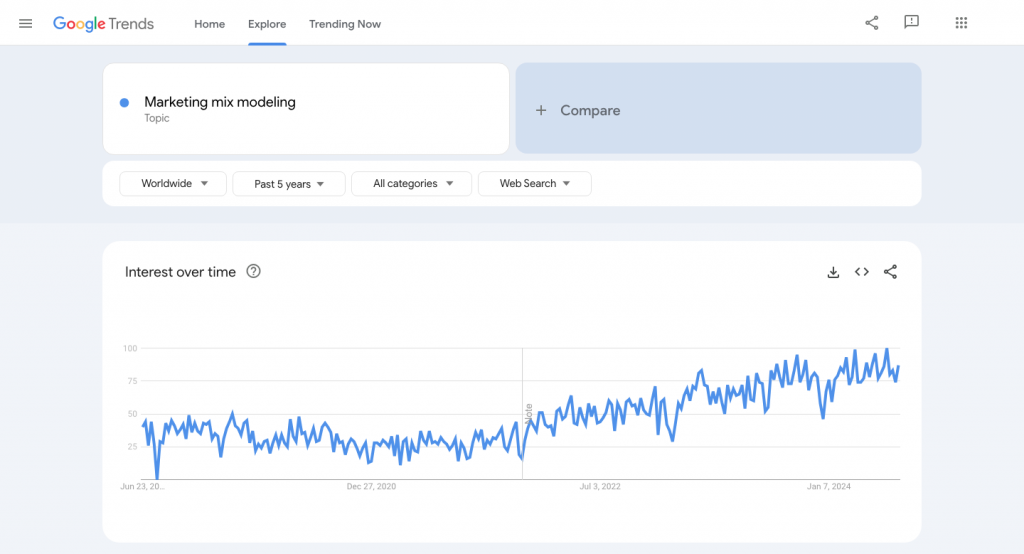Data-driven marketing is a complicated yet effective approach to marketing aimed at deeper customer analysis, efficient performance tracking, quality decision-making, and greater transparency along the way.
The transition to data-driven marketing is facilitated by marketing mix modeling, a powerful data science instrument allowing businesses to measure marketing effectiveness in-house.

What is marketing mix modeling?
Marketing mix modeling (or MMM) is an ensemble of statistical analysis techniques — fueled by historical sales and marketing data — that measure marketing effectiveness and simplify future performance forecasts.
This approach offers businesses a holistic view of their marketing efforts, aiding in channel optimization, budget (re)allocation, strategic planning, and more.
The rise in popularity of the MMM approach has been accelerated by Google’s official shutdown of third-party cookies announced in 2020 and put into action at the beginning of 2024:

As the ability to track consumer behavior online diminishes, MMM provides a comprehensive alternative to understand how marketing drives sales.
Open-source software in marketing mix modeling
Another key factor that explains the increasing popularity of marketing mix modeling is the availability of open-source software (OSS) with full open and reusable commercial licenses. LightweightMMM, Robyn, and PyMC-marketing released by Google, Robyn, and PyMC Labs, respectively, are just a few examples of OSS accessible in the market.
These platforms allow for the creation and deployment of robust marketing mix models that are continually evolving and improving through community contributions.
One of the best-in-class open-source marketing mix modeling software is PyMC-marketing which streamlines the process of MMM deployment for end-users. This OSS is based on a Bayesian MMM API with a suite of features designed specifically for marketing analysis:
- Adstock transformation to maximize the carryover of your marketing campaigns
- Saturation effects to see the roots of the diminishing returns
- Budget optimization to efficiently distribute your budget across various marketing channels
- Experiment calibration to tailor your marketing campaigns according to the results of hands-on experiments
Constantly upgraded by marketing experts and seasoned developers, PyMC-marketing solution leverages data science practices to optimize your marketing strategies leaving out the complexities often associated with the industry.
IT infrastructure to support a marketing mix model
While the power of open-source software facilitates the creation and customization of marketing mix models, machine learning (ML) models never exist without a solid IT infrastructure. The key elements of such infrastructure include effective data manipulation that allows businesses to accurately transform their data into insights and a simple and functional interface accessible to users of all experience levels.
Here, the team of software engineers from Jellyfish.tech comes into play. We deploy the best engineering practices to enable marketers to manipulate incoming data points, follow the process, and visualize the insights hassle-free.
The “building blocks” of an MMM infrastructure implemented by our technical team include:
- Data aggregation — using pandas and numpy, we collect and process data from multiple sources:
- Key performance indicators — e.g. sales volumes, number of subscriptions, revenue, sales for a given week, etc.
- External variables — e.g. seasonality, weather, market competition, macroeconomic forces that may affect your ad performance
- Historical sales and marketing data
- Architecture — we have created separate architecture by dividing the frontend, backend, and ML part of the platform into robust independent systems
- Model storage and management — we have used s3 buckets with private permissions for security purposes to allow for fast actions with files including model management, tracking, storage, and analysis
- Asynchronous model fitting — we have implemented a queuing system that allows for multiple background model fittings and therefore improves users’ productivity
- UI part — we have created a simple and user-friendly interface to give the possibility to use the platform not only to advanced users but also to beginners (with the system guide and notifications):
- Input screen to select the variables and run the model — i.e. a simple user-oriented interface offering a transparent view of model progress, estimated finish times, etc.
- Output screen — a variety of visualization options tailored to specific marketer requests — i.e. multiple charts with consistent colors to enable users to switch between tabs and check all the available data with ease
- User login — fully secure email authentication system with a trial period for users
- Admin panel — for managing user permissions and monitoring user activity
- Deployment — we have chosen the right instances for the best performance of our ML model. Also, our team has developed CI/CD pipelines to secure the deployments and adopt the blue-green strategy
- APIs that facilitate data transfers between the different components of an IT infrastructure
The more specific the variables, the more accurate the output. Therefore, we can assist you in tailoring the corresponding components of an MMM infrastructure — i.e. KPIs, external variables, visualization dashboards — to the specific business needs.
Discover the detailed MMM platform development process in our latest case study:
Conclusion
Robust system architecture, solid data pipeline to aggregate and process data points from various channels, simple and clear interface with a focus on usability, and tailored visualization tools make a marketing mix model a solid instrument for marketers to empower their strategy with data-driven insights.
Although deployment and support of MMM may seem a tedious assignment, the team of Jellyfish.tech could help you navigate the complexities of ML model infrastructure. Based on our hands-on experience with ML models, we will apply the best industry practices to ensure streamlined model management, enhanced performance, accuracy of data processing, and simplicity of use.



